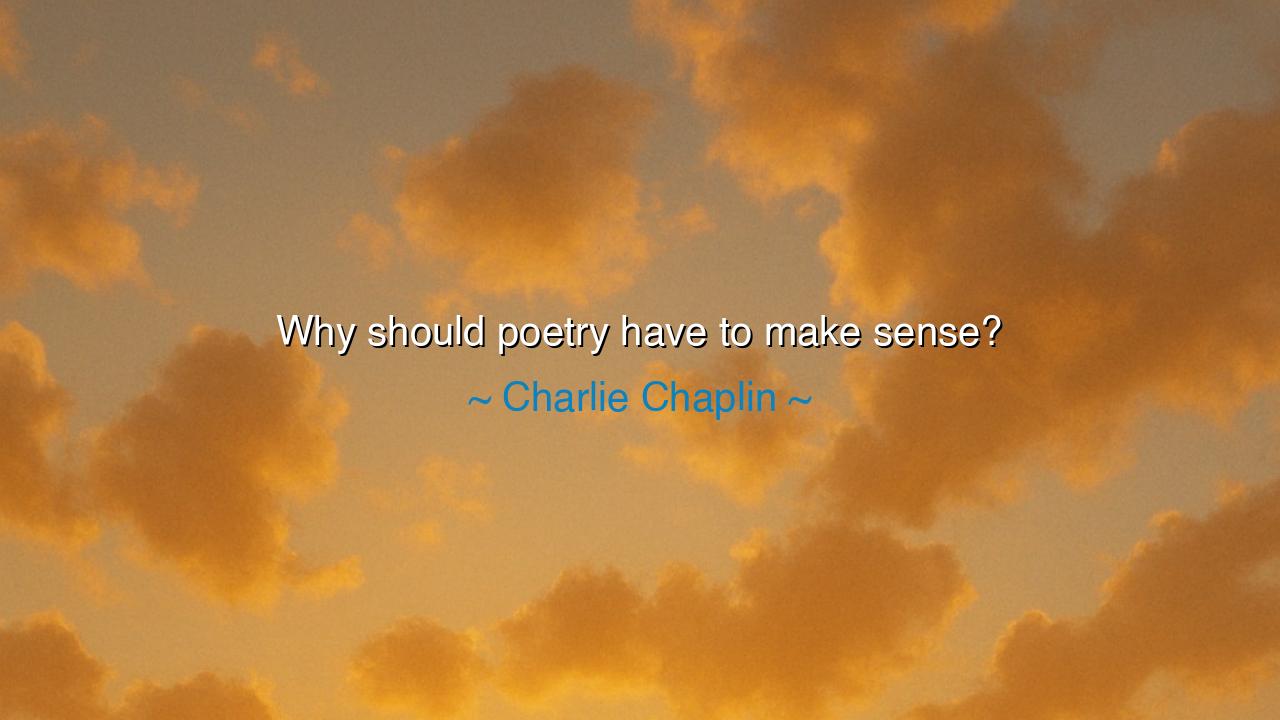
Why should poetry have to make sense?






Hear, O seekers of wisdom, the daring question of Charlie Chaplin, that silent jester who spoke volumes without words: “Why should poetry have to make sense?” In this single line he pierces the veil of convention, reminding us that art does not live to serve rules, but to stir the soul. He, who mastered laughter and sorrow in silence, understood that the deepest truths often defy logic, and that the music of life cannot always be forced into tidy order.
For what is poetry? Is it mere reason carved into verse, or is it the cry of the spirit given shape? To demand that poetry make sense is to chain the wind, to capture the ocean in a vessel too small. Poetry lives not only in what is explained but in what is felt—the tremor of awe, the shadow of sorrow, the blaze of joy. Sense belongs to the mind, but poetry belongs to the soul, and the soul often speaks a language beyond reason.
Chaplin knew this well, for his art was poetry in motion. In his silent films, there were moments of absurdity—a tramp chasing a rolling hat, a dance with bread rolls, a stumble that led to grace. To the logical eye, these were nonsense. Yet to the heart, they were deeply true, capturing the dignity of the poor, the loneliness of the wanderer, the resilience of the human spirit. So it is with poetry: what seems irrational to the mind may be eternal to the heart.
History too bears witness. Consider William Blake, the poet-prophet who saw angels in the trees and eternity in a grain of sand. His visions baffled many, for they did not “make sense” to ordinary reason. Yet his words still burn, for they revealed a deeper truth hidden beneath the veil of appearances. Or think of the Surrealists, whose strange verses and images unsettled logic but awakened imagination, teaching us that art is not bound by the laws of ordinary speech.
Thus, Chaplin’s challenge is not a dismissal of meaning, but an invitation to deeper meaning. He calls us to remember that not everything worth knowing can be measured or explained. Love does not always make sense. Grief does not always make sense. Hope, in the face of despair, makes no sense at all—yet it sustains us. So why should poetry, which mirrors the heart of life itself, be forced into the narrow prison of sense?
O listeners, learn from this: do not approach poetry with the mind alone. Approach it with the whole of your being. Let it bewilder you, let it disturb you, let it enchant you. Do not demand clarity, but receive mystery. For often what does not make sense to reason makes perfect sense to the soul, and in that paradox lies the power of poetry.
Practical is this wisdom: when you read a poem and find yourself confused, do not cast it aside. Sit with it. Read it aloud. Feel its rhythm in your breath, its images in your heart. Let it speak to you in ways beyond explanation. And in your own life, when moments arise that do not make sense—moments of loss, of wonder, of sudden beauty—do not flee from them. Embrace them, for they too are poems written by existence itself.
Thus let Chaplin’s words ring as freedom: poetry does not need to make sense; it needs only to be true to the heart. And when we accept this, we will find ourselves more fully alive, able to dwell not only in the clarity of reason, but in the vast mystery of being, where laughter and tears, joy and sorrow, nonsense and wisdom, are woven into one eternal song.






HTBui Huyen Trang
I find this question intriguing—why does poetry need to make sense? Is it meant to communicate ideas or feelings in a structured way, or does its power come from its abstract, often elusive nature? Chaplin seems to suggest that poetry can be appreciated for its form and emotion, not just its logic. Can a poem’s power come from its ability to challenge our expectations rather than meeting them?
PANguyen phuong anh
This quote resonates with me because poetry often plays with language in ways that don’t always fit traditional rules. It’s about expressing something deeper than straightforward meaning. But does that mean poetry should always resist making sense, or are there moments when clarity enhances its impact? I wonder if there is a line between artistic freedom and losing the message entirely.
HNLuong Thi Hong Ngan
Charlie Chaplin’s statement challenges conventional thinking about poetry. Why does poetry have to make sense? Perhaps the true value of poetry is not in its clarity, but in the way it allows for individual interpretation and emotional connection. What does it mean for poetry to 'make sense'? Can we appreciate poetry even when it defies logic or structure, as long as it speaks to us personally?
DPAnh Dung Pham
This quote makes me reflect on the creative freedom in poetry. Is it necessary for every poem to follow a logical or coherent structure, or is it enough for poetry to simply exist as a feeling or an expression? Maybe the true essence of poetry is its ability to defy traditional expectations and let us experience something beyond words. Does that make poetry less accessible or more universal?
PADang Phuong Anh
I think Charlie Chaplin raises an interesting point about the nature of poetry. Should poetry always have a clear message, or is part of its power found in its ambiguity? Sometimes, the beauty of poetry lies in its ability to evoke emotions or thoughts without needing to 'make sense' in the traditional sense. Does poetry need to be understood to be appreciated, or is its value in its mystery and emotional resonance?